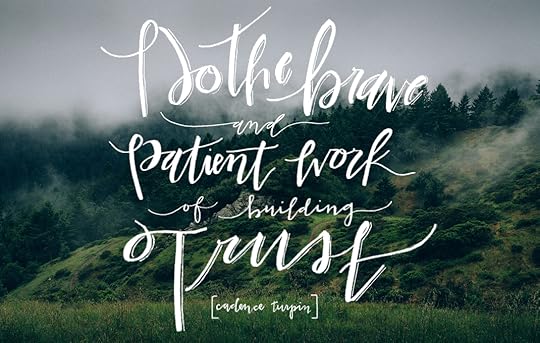Why Being Vulnerable is Leaving You Lonely
Vulnerability is a hot topic right now, and I couldn’t be more thrilled about it. Not only have I realized I have a lot to work on, but I’ve become more aware and thankful for the people in my life who model vulnerability well.
But I’ve also learned there are people who model vulnerability poorly.
Here’s what I mean.
Have you ever been setup to meet a stranger for coffee and left two hours later knowing every brutal detail about her recent divorce but still not her last name? Or followed someone on social media who posts vivid details about her personal life but is extremely difficult to engage with in person? Or dated someone who professed deep feelings for you before he even knew anything significant about you?

These are just examples, but chances are one or two of your own experiences came to mind. We all have known moments where it would have been nice to hit a big red “TMI” (Too Much Info) button like the Easy Button in the Staples commercials and suddenly watch the person across from you snap to their senses and return to an appropriate level of emotional exposure.
I don’t say any of this to sound judgmental, I more so want to acknowledge these actions come from a place of desiring to deeply connect in a way we all desire. But in these cases, this healthy desire is being sought out in a disastrous way.
This is the other end of vulnerability.
This is the emotional purging and over sharing of information with people whom you haven’t built a relationship of trust with. And it often leaves its culprits more lonely and lost than they were before.
Here are 3 ways I try to avoid unhealthy vulnerability:
1. Build trust. Take the time to get to know people before you spill your guts. 
While its true that vulnerability early on can be a good thing, it shouldn’t be forced or without respect for other people’s boundaries. Know not every person is meant to listen to and speak into your wounds. But when you do find trustworthy relationships, practice sharing things within them. I love how in Brene Brown’s book Daring Greatly, her daughter describes trustworthy friends as “the friends who ask me to sit with them, even if they’ve been asked to sit at the popular kids’ table.”
2. Put others first. Ever caught yourself spilling your guts to someone when you don’t know anything about their own story? Sometimes we get so set on unloading our own worries and struggles that we forget other people are carrying stuff, too. If you don’t take time to grow your heart for other people, how can you expect them to grow theirs for you? Ask questions and care about the answers. Few things are more exhausting or alienating than one-sided conversations.
3. Check your motives. If you’re about to post anything on social media that’s out of a place of desiring people to reach out to you, tap that iPhone home button. Then bravely reach out to someone you trust and share what’s going on. A simple and helpful question I try to ask myself before I post anything is “Why?” If my convictions ever tell me it’s from a place of frustration or loneliness, I delete it. Chances are I’d want to delete in the next day anyway. I have never regretted being vulnerable with someone I trust, I have regretted things I’ve posted on the Internet.
Vulnerability thrives within trusting relationships.
Don’t get me wrong, it can be a beautiful thing to be publicly vulnerable (and I try to be, often), but only when it’s motivation is to spread hope and understanding. And usually after I’ve already confided in someone I trust.
If our public vulnerability is an attempt to gain the benefits of intimacy, we’re actually moving further away from what we really want. May we do more of the brave and patient work of building trust with one another instead, and begin to experience deep healing and hope because of it.
Why Being Vulnerable is Leaving You Lonely is a post from: Storyline Blog
Donald Miller's Blog
- Donald Miller's profile
- 2745 followers



